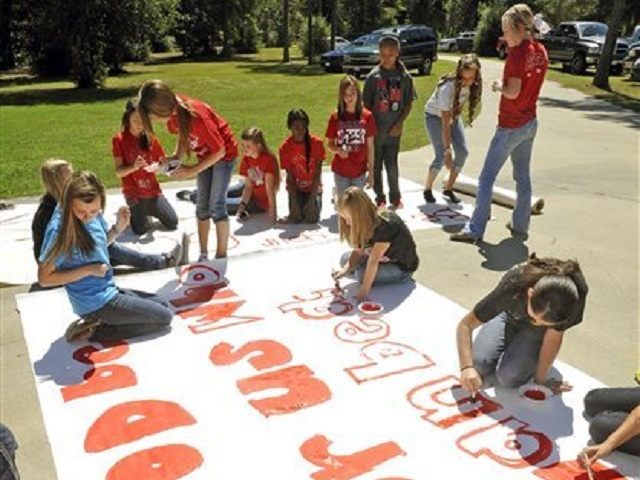The Texas Supreme Court issued an opinion today ruling in favor of the Kountze cheerleaders who had Bible verses on their school football banners. The case has received national media attention.
Kountze, Texas, is located in Hardin County in east Texas. It is part of the Beaumont-Port Arthur metropolitan area.
Among other legal counsel, Kelly J. Shackelford and other lawyers from the Liberty Institute in Plano, Texas, represented the parents of the students.
Texas Values President and attorney, Jonathan Saenz, stated, “Today we celebrate the victory of free speech and the First Amendment rights of Texans. These brave cheerleaders refused to back down on their beliefs, even when faced with the typical losing intimidation tactics of the Freedom From Religion Foundation. The fearless resolve of these Texas cheerleaders will impact generations to come. We are grateful that the Texas Supreme Court upheld our Constitutional rights and we congratulate our friends at Liberty Institute for their tireless work on this important case. Now, we anticipate the Ninth Court of Appeals will rule in favor of the cheerleaders and permanently ensure their Constitutional liberty.”
The Freedom From Religion Foundation (FFRF) filed a complaint and the Kountze School District banned the cheerleaders from making these signs. Officials at the District claimed they had the authority to ban the speech because it was government speech.
Middle school and high school cheerleaders, through their parents, sued the Kountze ISD after the District prohibited them from displaying religious signs or verses or messages at school-sponsored events.
Kountze ISD responded to the law suit by filing a plea to the jurisdiction urging the District had governmental immunity. The District also argued that the parties who filed the lawsuit lacked standing to sue.
The District later supplemented their plea to the jurisdiction claiming the issue was moot in light of its subsequent adoption of Resolution and Order No. 3. It provided that the District is “not required to prohibit messages on school banners … that display fleeting expressions of community sentiment solely because the source of origin of such message is religious” but “retains the right to restrict the content of school banners.”
The trial court judge denied the District’s plea to the jurisdiction and the District appealed to the Ninth Court of Appeals in Beaumont, Texas.
The Ninth Court of Appeals reviewed the interlocutory appeal and reversed the trial court’s order in part, finding all the cheerleaders’ claims for declaratory and injunctive relief were moot because the District had decided to stop banning banners that contained religious signs or messages at school events.
The court of appeals did not make a decision about governmental immunity or standing.
Justice Devine noted in the opinion that while the school district no longer prohibited the cheerleaders from displaying religious signs or messages at school events, “that change hardly makes ‘absolutely clear’ that the District will not reverse itself after this litigation is concluded, without the cheerleaders’ requested declaratory and injunctive relief.”
The Court noted that “Throughout this litigation, the District has continually defended not only the constitutionality of that prohibition, but also its unfettered authority to restrict the content of the cheerleaders’ banners—including the apparent authority to do so based solely on their religious content. In fact, while the District has indicated it does not have any current ‘intent’ or ‘plan’ to reinstate that prohibition, the District has never expressed the position that it could not, and unconditionally would not, reinstate it.”
In summary, the Court ruled that the District’s voluntary abandonment provided no assurance that the District will not prohibit the cheerleaders from displaying these banners in the future. Moreover, the Resolution and Order No. 3, the Court noted, “only states the District is not required to prohibit the cheerleaders from displaying such banners, and reserves to the District unfettered discretion in regulating those banners-including the apparent authority to do so based solely on their religious content.” (emphasis the Court’s own)
The opinion which was written by Justice Devine granted the cheerleader’s petition for review, and reversed the decision of the intermediate appellate court in Beaumont, and remanded the case back to that court.
Friend of the Court briefs (“Amicus Curiae“) were filed by John Cornyn and Ted Cruz, the American Jewish Committee, and the American Civil Liberties Union (ACLU).
This article has been updated with additional content.
Lana Shadwick is a writer and legal analyst for Breitbart Texas. She has served as a prosecutor and associate judge. Follow her on Twitter @LanaShadwick2

COMMENTS
Please let us know if you're having issues with commenting.